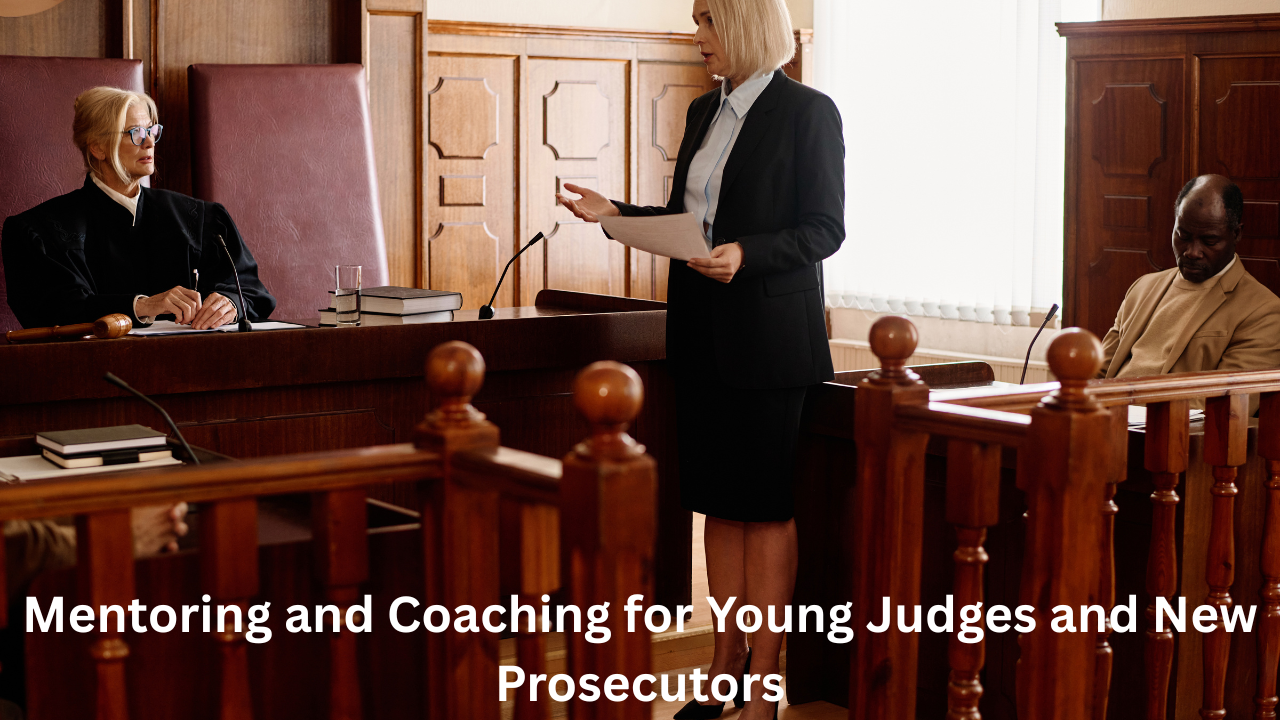
Entering the legal arena as a young judge or prosecutor is both an honor and a heavy responsibility. These professionals are expected to carry the weight of justice, public expectations, and legal intricacies from day one. But while legal education lays the foundation, it is mentoring and coaching that build true competence and confidence. This article explores how mentoring and coaching empower young judges and new prosecutors, enhance ethical judgment, accelerate professional development, and ensure institutional continuity in the justice system.
Why Mentoring and Coaching Matter in Judicial and Prosecutorial Careers
Unlike many professions, judges and prosecutors are often thrust into high-stakes roles with limited on-the-job experience. A strong support system through mentoring and coaching helps fill these early-career gaps.
Key Benefits Include:
- Faster Skill Acquisition – Young professionals learn courtroom behavior, evidence rules, and legal ethics faster.
- Ethical Reinforcement – Guidance prevents early missteps that can damage careers or public trust.
- Confidence Building – Mentors provide psychological support in high-pressure situations.
- Career Development – Mentees gain insight into career paths, specialization, and professional standards.
Mentorship is more than guidance—it’s a safeguard for justice.
Types of Mentoring and Coaching Structures
| Mentoring Type | Description |
|---|---|
| Formal Mentoring | Structured programs organized by judicial or prosecutorial academies |
| Peer Mentoring | Colleague-to-colleague support, often among the same seniority group |
| Shadowing Programs | New appointees observe senior officials in real-time settings |
| One-on-One Coaching | Targeted sessions to refine decision-making or leadership skills |
| Group Coaching | Workshops or roundtables with guided discussions and case reviews |
These various formats allow flexibility in training according to institutional size and professional needs.
What Should Mentors and Coaches Teach?
Mentoring programs for judges and prosecutors must address a wide range of knowledge, including:
- Substantive Legal Knowledge
- Case law, procedural norms, sentencing frameworks
- Ethical and Professional Conduct
- Avoiding conflicts of interest, impartiality, integrity
- Courtroom Management and Decision-Making
- Handling media, conducting hearings, drafting rulings
- Communication and Community Trust
- Public speaking, legal writing, explaining decisions to non-legal audiences
- Stress and Time Management
- Preventing burnout, maintaining work-life balance
Mentors who share personal failures as well as successes offer invaluable real-world learning.
Challenges in Building Effective Mentorship Programs
While mentoring is powerful, several challenges must be addressed to make programs effective:
| Challenge | Impact |
|---|---|
| Lack of Time Among Seniors | Reduces availability for meaningful mentoring |
| Mismatched Pairings | Weakens rapport and trust between mentor and mentee |
| Inadequate Program Design | Results in unfocused sessions without measurable outcomes |
| Resistance from New Professionals | Some mentees see mentoring as a sign of inadequacy |
| Lack of Evaluation Metrics | Makes it difficult to improve or justify mentoring programs |
Overcoming these challenges requires institutional commitment and feedback-based adjustments.
Institutional Support and Global Best Practices
Countries and legal systems worldwide have introduced successful mentoring initiatives:
- United States: Many state judicial councils run structured mentorship programs for judges.
- India: National Judicial Academy encourages senior judges to coach High Court appointees.
- United Kingdom: CPS (Crown Prosecution Service) provides competency-based coaching to new prosecutors.
- Canada: Use of judicial coaching circles and evaluation rubrics to guide ethical consistency.
Institutions must provide logistical support—funding, policy frameworks, and recognition—for mentors to participate meaningfully.
Overview Table: Mentoring and Coaching for Legal Professionals
| Focus Area | Key Insight |
|---|---|
| Purpose | Accelerates competence, ethics, and confidence |
| Formats Available | Includes formal mentoring, peer support, coaching sessions |
| Core Teaching Areas | Legal skills, ethics, decision-making, time management |
| Implementation Challenges | Time constraints, poor pairing, lack of evaluation |
| Institutional Role | Provide frameworks, training, and incentives for mentors |
| Global Examples | US, UK, India, and Canada show the value of structured programs |
How to Make Mentorship Work: Tips for Both Sides
For Mentors:
- Be approachable, honest, and committed to regular engagement.
- Focus on sharing context, not just instructions.
- Encourage critical thinking, not dependency.
For Mentees:
- Be proactive, open to feedback, and committed to learning.
- Treat mentorship as a partnership, not a lecture.
- Keep notes and seek clarification to maximize benefit.
When done well, mentoring relationships evolve into long-term professional alliances.
Conclusion
Mentoring and coaching are not optional luxuries in the legal profession—they are strategic necessities. As judges and prosecutors shape lives, liberty, and society itself, their growth must be grounded in support, reflection, and shared wisdom. When senior professionals commit to coaching, and institutions commit to enabling them, the ripple effect is a stronger, fairer, and more resilient justice system.
Top 3 One-Line FAQs
1. Why is mentoring essential for new judges and prosecutors?
It fast-tracks skill development, enhances ethical awareness, and builds decision-making confidence.
2. What makes a mentorship program effective?
Clear goals, regular engagement, and compatibility between mentors and mentees.
3. Do formal mentorship programs exist in judiciary systems?
Yes, many countries implement structured coaching through judicial and prosecutorial academies.

